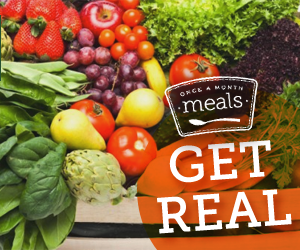**This post is part of the Get Real series. Please remember that this is meant as a learning community. We know that many of you are passionate about what you do and we want you to express that, just please do so in a way that will be an encouragement and aid to others making a transition. We want this to be a “safe space” for participants to learn. For that reason, we reserve the right to delete any comments that are not handled in this manner.
This month is all about canning and freezing your tasty, nutritious whole foods. Why are these the best methods of food preservation to use if you are a whole foodie? I’m glad you asked! There are several reasons these methods are optimal for those of us striving to make whole foods a priority in our homes:
- There are minimal to no preservatives used to maintain the quality and freshness of food. With freezing, most foods require no other preservatives; with canning, there are small amounts of preservatives that are necessary, but you can be sure to choose very basic and natural options.
- You know exactly what has gone into your food and who has handled your food.
- These methods preserve the greatest amount of nutrients at the food’s peak of freshness. Some canning methods may have a very slight loss of vitamins or minerals during the heating portion of the process.
- These methods are cost-effective (most of the time). There are definitely times when canning is not the least expensive option, but I think it’s worth a few extra pennies here and there when the quality of the food you are eating is increased. Freezing is a no-brainer when it comes to the inexpensiveness of the process.
Although most of the research I found favors freezing over canning, canning has many benefits. Canning is a time-tested method that has been done for over four thousand years and has been passed down through the generations. It is a very specific art form and a precision form of cooking, with little to no room for spontaneity or improvising. If your home lacks sufficient freezer space, then canning is definitely a great option for you. One canner I spoke with says that she almost always prefers canned stone fruits (such as peaches) to frozen since they keep their color and flavor better when canned. Also, home canned items make wonderful gifts for friends or family.
What do you think, is canning something you want to try? How much canning experience have you had? Do you have a favorite canning recipe or technique? Let us know in the comments!
Zucchini Refrigerator Pickles
Makes one quart jar or two pint jars
- 2 pounds zucchini, cut into 1/4 inch rounds
- 1 pound onions, cut into slender rings
- 2 cups ice
- 1/2 cup pickling salt, or Diamond Kosher Salt
- 2 cups distilled white vinegar
- 2 cups water
- 1/2 cup granulated sugar
- 2 teaspoons pickling spice blend (see recipe below)
- Combine the zucchini, onion slices, ice, and salt in a large bowl. Add cold water until the zucchini and onion are covered. Set aside for two hours.
- Drain the zucchini and onions well. Rinse them, then drain them again. Place the zucchini mixture back in the large bowl.
- To make the brine, combine the vinegar, water, sugar, and spice blend. Bring to a rapid boil in a medium-sized saucepan. Use a stainless steel or enamelware saucepan. Do not use aluminum, as it can leech!
- Pour the brine over the zucchini mixture. Ladle into jars. Allow to cool to room temperature; refrigerate for up to three weeks.
Hilary’s All-Purpose Pickling Spice Blend
- 4 tablespoons dill seed (or celery seed if you do not prefer the taste of dill)
- 2 tablespoons black peppercorns
- 1 tablespoon mustard seed
- 1/2 tablespoon turmeric
- 5 bay leaves, crumbled
Combine all spices in a mason jar. Store for future use. Use this blend for any recipe that calls for pickling spice.
August Week One Action Item:
Each week we will try to give you some simple action steps to put this journey into practice. It is important that you start this journey by understanding yourself, your goals, and perhaps your obstacles.
- Try a simple canning recipe and see what you think! I am including a tasty, easy recipe for zucchini refrigerator pickles that I just learned at a canning class this past week. No expert skills are required for this one.
August Get Real:
Please take a moment to thank our guest authors by clicking over to their sites and/or liking them on Facebook and/or Twitter.
Sponsor: Once A Month Meals